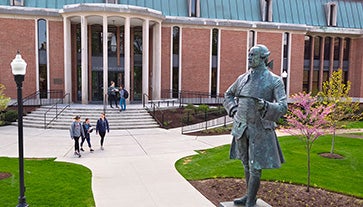
If current trends in nursing education are any indication, today’s nurses are ready to embrace new technologies, care models, and learning methods to improve patient outcomes. Nurses are highly visible in these changes, taking their place as industry leaders to implement these advances in the healthcare industry that will empower and support those in their care.
Nurses in 2024 are looking forward to the future—and that means leaning into innovations like artificial intelligence and simulation-based learning, as well as focusing on competency-based education, evidence-based practice, and learning cultural competencies.
As the American healthcare system continues to learn from the COVID-19 pandemic, an emphasis on patient advocacy, holistic therapies, remote health monitoring, and community-based initiatives are also taking center stage for new and advanced practice nurses.
Nurse educators and high-quality nursing programs are taking a cue from these trends and making major changes, adapting everything from first-semester curricula to capstone projects.
In celebration of how nurses are learning—and leading— in a new era of patient care, let’s take a look at how nursing trends of today will continue to shape the healthcare landscape of tomorrow.
Emphasis on developing technologies.
It almost goes without saying (and is certainly difficult to sum up in a paragraph or two), but technological innovations continue to rapidly change how nurses plan and deliver care.
Nursing education programs are constantly adapting to better leverage these new technologies. Electronic health records (EHRs), therapy devices with clinical support algorithms, and AI-informed remote patient monitoring are all relatively new to healthcare, and nurses need to be on the front lines of understanding how it all fits together.
Engaged faculty in high-quality nursing programs are paying close attention to technology trends in nursing and teaching on these innovations in their curriculum at every level. It can be hard to predict exactly which technologies will emerge as most important in the day-to-day practice of nurses, so a comprehensive knowledge of what’s new and getting noticed will help tomorrow’s nurses be prepared.
Focus on competency-based education and evidence-based practice
Educational nursing organizations and programs of nursing are moving toward competency-based educational models. This means that nursing programs look at what the student “can do” as they prepare to enter the field of nursing.
As the available medical literature continues to expand, nurses are leading the development and implementation of evidence-based practice (EBP).
Evidence-based practice incorporates the latest research and evidence while still acknowledging each patient’s individual needs. Nurses are empowered to not only apply their critical thinking skills in the implementation of EBP but also have the opportunity to increase their agency by creating and developing best practice.
Nursing education programs need to ensure that nurses are well-equipped to access and create the latest evidence so that they can continue to deliver up-to-date, patient-centered care. They are also teaching their students how to critically approach new research findings and incorporate those findings into their interventions. Nurses who can evaluate and adapt the latest science into their care model are prepared to ensure better patient outcomes.
Community-based healthcare
Community-based healthcare is a nursing trend aiming to expand medical access in marginalized or underserved communities. These interventions bring care to the patients, delivering services in the places where they live and work instead of in traditional settings like doctors’ offices and hospitals.
Public health programs, community outreaches, and public educational initiatives are being implemented to make an impact on the individual level as well as larger groups. Nurses who lead or participate in immunization campaigns, infectious disease surveillance, and maternal healthcare promotion can promote health on a holistic level to entire communities.
Nursing education programs are creating entire courses based on understanding and implementing community-based healthcare on a practical level, as well as holding discussions about the way these initiatives shape the ethics of the field as a whole.
Patient advocacy
Patient advocacy has long been a core principle of nursing practice. But it is becoming a more prominent nursing education trend that reflects the challenges and opportunities of the current healthcare system.
Nurses of the future are leading and learning new ways that they can take on the role of advocates for their patients. Acting as a champion of personal rights and responsibilities, addressing barriers to care, promoting reforms, and bringing patient safety into focus are all concrete actions that nurses can take to be advocates within their healthcare role.
Nurses who have extensively studied nursing theory and have had coursework on addressing obstacles in care delivery are well prepared to help patients get the care every person deserves.
Artificial intelligence
AI is trending everywhere, and the nursing field is no exception. Some industry-leading nurses even predict that AI will transform every aspect of nursing within the next few decades. Nursing education programs are already getting better equipped to help nurses use artificial intelligence in their practice.
This means introducing students to the basics of AI and teaching them about clinical decision-making support systems (CDSS), AI-powered tools for providing evidence-based care. Some nursing programs are equipped with simulators and virtual reality technology, which brings AI into the classroom.
Top-tier nursing programs are updating their curricula to include in-depth discussions on artificial intelligence ethics and legal questions in their coursework. Data privacy, algorithm bias, and the impact of AI on the patient/provider relationship are all real issues that every nurse should engage with before they enter the field.
Cultural competence and diversity
Cultural competence training and diversity education empower nurses to deliver care to individuals from a wide range of backgrounds. Coursework meant to increase empathy and understanding for different people groups has become a nursing education trend, and passionate nurses are leading the charge to eliminate health inequalities and bias in the healthcare setting.
Cultural competence involves understanding how different cultures experience healthcare and incorporating that knowledge into patient advocacy and individual care plans. These cultural beliefs, behaviors, and values can have an impact on health outcomes. Quality nursing programs are refining their curriculums to help their students be prepared for the wide array of cultural diversity that they will encounter during their careers.
Holistic, whole-life care.
The concept of “holistic” care has become a trend in nursing and nursing education. This concept refers to seeing healthcare across the lifespan, not as a series of isolated events. It comes from the term “holism,” the idea that the whole is more than the sum of its parts and that the health of your spirit and mind are both vital to the health of your body.
The holistic care model seeks to prioritize people’s needs on an individual level, addressing lifestyle choices, family history, and cultural differences. It also leans heavily into preventative care and patient education.
Nurses who are educated on holistic care are prepared to work in collaborative care teams that create care plans across disciplines. Nursing students learn about how to do holistic assessments as well as complementary and alternative therapies. They also study the body’s interconnectedness and reflect on their own beliefs about health and healing.

Can a virtual nursing education adapt to changing trends?
Some online nursing programs are fully embracing the changes in the healthcare industry as they prepare their students for practice in the field.
As technology changes and society evolves, the timing has never been better to be an online nursing student.
At Wilkes University’s Passan School of Nursing, students can pursue a flexible and online curriculum without sacrificing the innovations of a modern nursing education.
The faculty at Wilkes are engaged with current trends in nursing and are prepared to adapt these innovations into the curriculum.
Program options include:
- Accelerated Bachelor of Science in Nursing (ABSN)
- Associate Degree in Nursing (RN) to MSN
- Master of Science in Nursing (MSN)
- Doctor of Nursing Practice (DNP)
- Post Graduate / APRN Certificate
- PhD in Nursing
Click here to learn more about virtual nursing education options designed with innovation and the future in mind.





